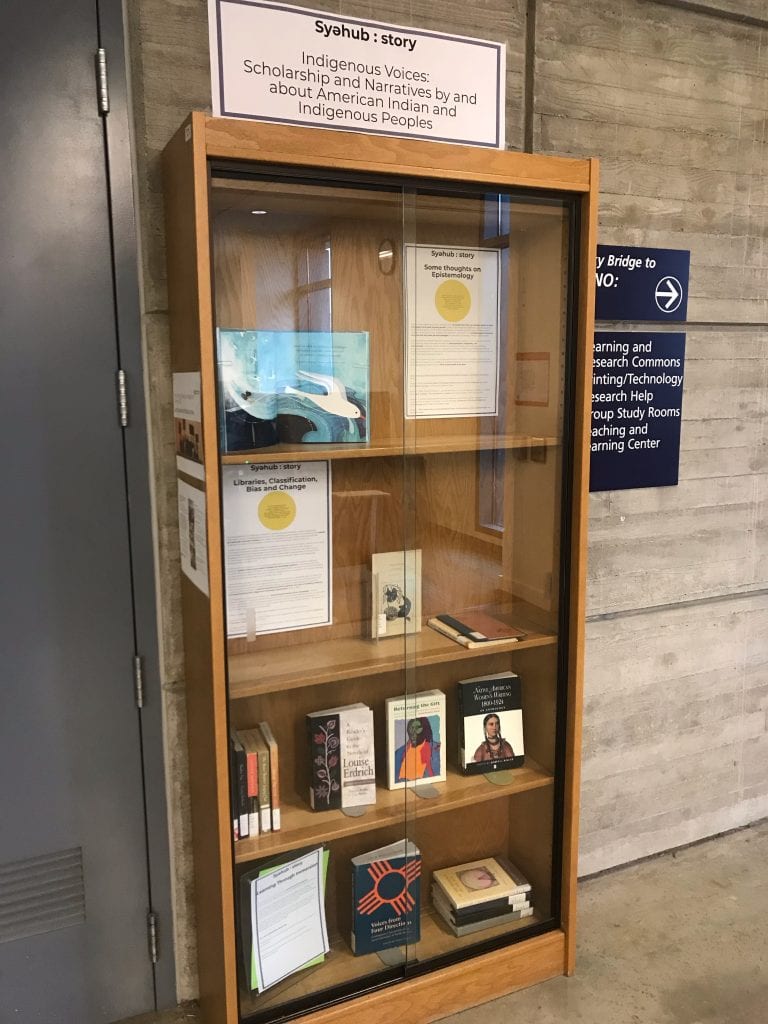epistemology: the theory of knowledge, especially with regard to its methods, validity, and scope. Epistemology is the investigation of what distinguishes justified belief from opinion.
Meyer highlights that “all people have their own distinct beliefs of what knowledge is and what knowing entails” (2008, p. 219), and Deloria (1999) discusses the extent to which Western science “limits itself by insisting that all data fall within the reigning interpretative paradigm of the time” (p. 44). At stake is the argument – and belief – that multiple ways of knowing exist, and that they must be acknowledged, an idea often discarded by Western science (ibid.).
Our new exhibit in the Tioga Library Building (TLB) is an attempt at presenting multiple epistemologies through the lens of scholarship, traditional tales, and literature. Syəhub means story in Lushootseed. We chose this as the title of our exhibit, because the books we are displaying represent a multitude of stories. Wherever possible, we have highlighted “#OwnVoices” and “IndigenousReads” titles. And, to paraphrase the author Chimamanda Ngozi Adichie, there is strength and necessity in hearing multiple versions of stories.
Applied Indigenous epistemology and Indigenous knowledge systems can be an act of reframing and reclaiming, which dialogues with work on postcolonialism, indigeneity, and decolonization. Currently, all sorts of fields are looking at Indigenous knowledges, including archaeology and ethnobotany (cf., e.g., Atalay, 2012, and Nader, 1998). And yet the movement to look at multiple perspectives and different knowledges continues to be entangled with issues of, e.g., intellectual property, intangible cultural heritage, genome sequencing (and copyrighting) of native plants. There is more work to be done.
In putting together the titles on display, we spoke to several UW Tacoma faculty members to make sure we had a meaningful selection. Please let us know if there are titles to add to this exhibit, or titles we can purchase for the collection.

We hope some of the following titles are inspirational to you in learning about — and doing — this sort of work.
Atalay, S. (2012). Community-Based Archaeology Research with, by, and for Indigenous and Local Communities. Berkeley: University of California Press.
Deloria, V. (1999). If you think about it, you will see that it is true. In B. Deloria, K. Foehner, & S. Scinta (Eds.), Spirit & Reason : The Vine Deloria, Jr., Reader (pp. 40–60). Golden, Colo.: Fulcrum Pub.
Meyer, M. A. (2008). Indigenous and authentic: Hawaiian epistemology and the triangulation of meaning. In N. K. Denzin, Y. S. Lincoln, & L. T. Smith (Eds.), Handbook of critical and indigenous methodologies (pp. 217–232). Los Angeles: Sage.
Nader, L. (1996). Naked science: Anthropological inquiry into boundaries, power, and knowledge. New York: Routledge.